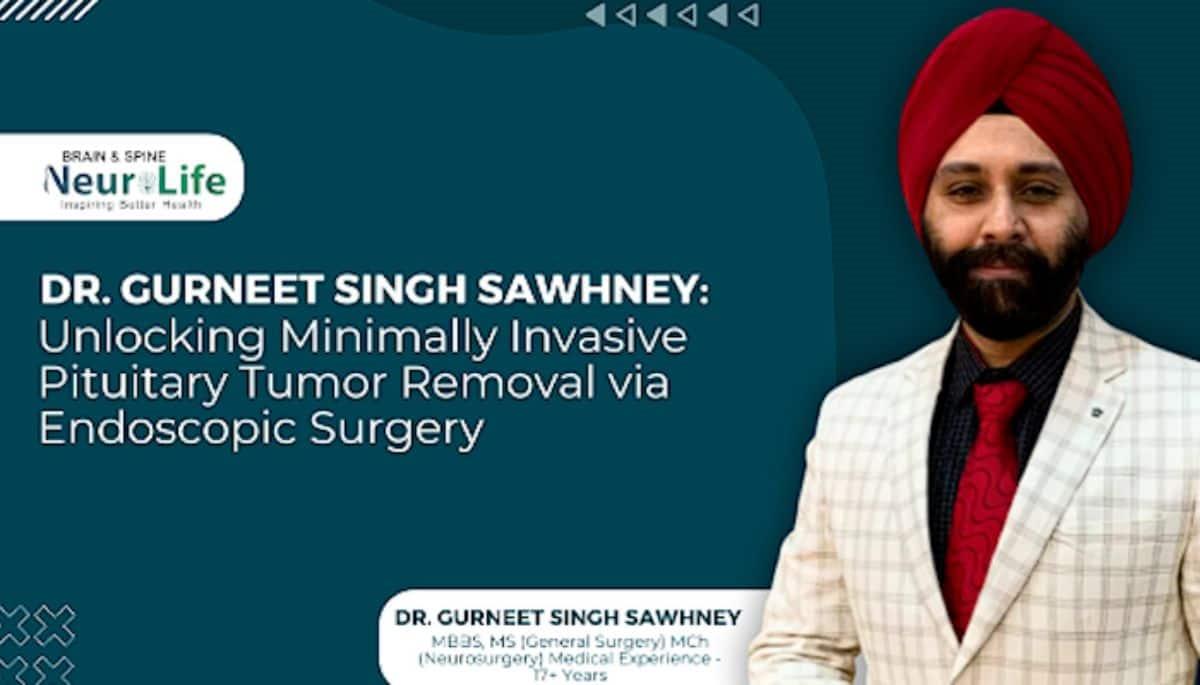
Dr. Gurneet Singh Sawhney: Unlocking Minimally Invasive Pituitary Tumor Removal Via Endoscopic Surgery
Dr. Gurneet Singh Sawhney, a leading neurosurgeon in Mumba , explains that the endoscopic transnasal approach also known as transsphenoidal surgery removes pituitary tumors without needing external incisions. Tumors refer to abnormal growth in the pituitary gland located at the brain's base. These patients have hormonal imbalances and complain of headaches, issues in vision, and so on.
The treatment of pituitary tumors primarily includes transsphenoidal surgery and craniotomy. Choosing any of them depends upon the size, location, type of tumor, and the patient's overall health condition.
He states, "This transnasal approach requires an endoscopy through a thin tube attached with a camera and light at the end. The tube then gets inserted through the nasal passages to remove the tumor".
He adds, "By accessing the tumor through the natural openings in the nose, we can avoid incisions in the scalp or face, resulting in less pain, faster recovery, and minimal scarring for the patients."
On the other hand, a craniotomy is a traditional open surgery in which the neurosurgeon makes an incision on the side of the head to access the pituitary gland through the skull. This procedure is suitable for removing complex and/or large-sized tumours and allows neurosurgeons to gain better access to certain locations of the pituitary glands. However, a craniotomy procedure implies a larger incision and risk of complications such as facial nerve damage or other neurological complications. The recovery time is considerably longer.
Dr. Gurneet Singh Sawhney clarifies various conditions of pituitary gland tumors, which can be treated through endoscopic surgery via the nasal route, viz. pituitary adenoma at pituitary gland, craniopharyngioma at the cells near the pituitary stalk, Rathke's cleft cyst located between the anterior and posterior lobes of the pituitary gland, Meningioma: a tumor that grows from the meninges, the membrane surrounding the brain and spinal cord and chordoma, bone tumor that grows from the skull base. Craniopharyngioma and Rathke's cleft cyst are benign, while chordoma is malignant.
In the case of prolactinomas, surgery is not recommended. They are treated with medication. Also, in some instances of tumors wherein neurosurgeons cannot perform endoscopic surgery via the nasal route, an extensive craniotomy may be required.
Neurosurgeons perform this surgery under anaesthesia; this incision-less technique reduces the dangers associated with conventional surgical treatment and allows for a quicker return to everyday activities. Patients enjoy shorter hospital stays and early recovery. This method is beneficial for patients who have tumors in the sellar/suprasellar regions.
Ms. Vishaka Goyal, co-founder of ClinicSpot , a healthcare and doctor discovery platform, asserts Dr. Gurneet Singh Sawhney's expertise and states: 'With over a decade of experience, he is one of the most accomplished neurosurgeons I have come across in India. He has acquired remarkable expertise in performing endoscopic neurosurgery. He strives to offer comprehensive neurosurgical treatment and care. People can trust him to help them recover successfully with his treatment.'
Under the aegis of expert neurosurgeons such as Dr. Gurneet Singh Sawhney, patients can seek pituitary tumour removal through minimally invasive endoscopic procedures, reduce the risk associated with traditional surgeries, and improve the scope of outcomes. He hopes that more neurosurgeons adopt this technique to remove pituitary tumors as it ensures a better and speedy recovery.
For consultations or inquiries, contact Dr. Gurneet Singh Sawhney at the following addresses: -
NeuroLife Brain & Spine Clinic,
C-118, 1st floor, Hall Mark Commercial Complex, Vasant Oscar, LBS Marg, Mulund West, Mumbai, Maharashtra – 400082.
About Dr. Gurneet Singh Sawhney
Dr. Gurneet Singh Sawhney is a highly respected neurosurgeon based in Mumbai, India, with over 18 years of practice, including six years as an expert in complex brain and backbone surgeries. Dr. Gurneet Singh Sawhney is well-acclaimed for his top-notch talent and potential to treat complicated and crucial brain and spinal cord illnesses. His expertise in Stereotactic Radiosurgery, Epilepsy Neurosurgery, Functional Neurosurgery, and Neuroendoscopy because of his deep-seated interest in neurosciences sets him apart.
A patient-centric doctor with proficiency in more than ten languages, Dr Gurneet Singh Sawhney, handles his patients with warmth and comprehensive care. With a focal point on minimally invasive strategies, Dr Gurneet Singh Sawhney has successfully treated numerous patients with neurological disorders, enabling them to recover well and resume normal lives.
Legal Disclaimer:
MENAFN provides the
information “as is” without warranty of any kind. We do not accept
any responsibility or liability for the accuracy, content, images,
videos, licenses, completeness, legality, or reliability of the information
contained in this article. If you have any complaints or copyright
issues related to this article, kindly contact the provider above.


















Comments
No comment